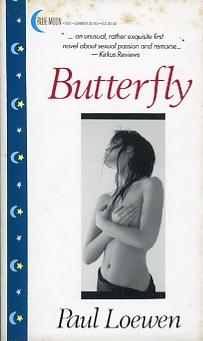Butterfly
Pinkerton's German grandson in postwar Nagasaki
By William Wetherall
First posted 12 August 2008
Last updated 22 May 2010
Paul Loewen The name of the copyright holder is given as Paul Leu. The "Editor's Preface" (ix-xvi), which is part of the novel, is signed "Paul Loewen, La Tranche-sur-Mer, August 30, 1987". The preface opens in the spring of 1944 with Loewen at home in Heidelberg on leave during a war that was not going well for Germany. He is playing a record of Elisabeth Schwarzkopf singing the aria "Un bel dì" from Madame Butterfuly when his mother becomes distraught and asks him to stop the record (pages ix-x).
Loewen hears the story from his mother, and after the war, having studied to become a civil engineer, he has an opportunity to go to Japan as part of a United Nations exchange program. His mother encouraged him to visit some of her cousins, and to look for traces of his grandfather, whose last known address, circa 1914, was in a part of Nagasaki that had not been damaged by the atomic bomb. People insist that the man who would have been Pinkerton had never come back. Loewen, though, sniffs around and hears stories of a foreigner called Taizan -- "the kind of name given to Buddhist acolytes" -- "an eccentric old fellow, a sort of philanthropic recluse who had been around for as long as anybody could remember" (pages xi-xii). He then finds a woman named Midori, who had been Taizan's housekeeper, and has in her possession some manuscripts he had given her to burn just before he died (page xii).
The main text of Butterfly includes, of course, an English version of the German manuscript, which the preface suggests was as full of "the illicit, not to mention the perverse" as Lady Chatterley's Lover (page xiii). The story is told in 112 numbered small parts grouped in three large parts. Some small parts are excerpts from the Nagasaki manuscript, some are letters between various correspondents including Pinkerton and Butterfly, some are editorial notes, and others are digests of the editor's interviews with people who were able to personal the editor with useful information. The closing part (page 272) is said to be "Reconstituted from the editor's notes on his interview with Midori, Taizan's housekeeper, on October 19, 1952. Midori died in 1957, at least partly because of exposure to radiation." In two paragraphs that don't quite fill the page, Midori, speaking as "I", tells of going to see Taizan two or three days after the blast, and of having visited him every afternoon after that, his behavior, his final requests, and the day she found him dead. Blue Moon BooksBlue Moon Books was founded in 1987 by Barney Rosset, who had purchased Grove Press in 1951 and was responsible for introducing Henry Miller and Samuel Beckett at Grove. Blue Moon, which specialized in both classic and new erotica, was picked up by Avalon Publishing Group in 1998. In 2006, Avalon was said to have sold Blue Moon Books to Soft Skull Press (Poets & Writers, July/August 2006), but apparently the deal fell through and, without an advocate at Avalon, the imprint died. |
